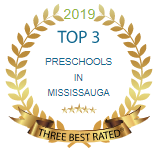• Does your child love school and can’t wait to go every day? If so, consider yourself lucky. Why tinker with a winning school situation when so many families are frustrated and disappointed?
• Your child has waited two long years to be one of the five-year-old leaders of her class.
• The third year is the time when many of the earlier lessons come together and become a permanent part of the young child’s understanding. An excellent example is the early introduction to addition with large number through the Bank Game. When children leave Montessori at age five, many of their still-forming concepts evaporate, just as a child living overseas will learn to speak two languages, but may quickly lose the second language if his family moves back home.
• As a five-year-old, your child has many opportunities to teach the younger children lessons that he learned when he was their age. Research proves that this experience has powerful benefits for both tutor and tutoree.
• As five-year-olds, Montessori children normally go on to even more fascinating lessons and more advanced Montessori materials, such as the Stamp Game.
• The Primary Montessori curriculum is much more sophisticated than that found in most kindergartens.
• Your child already knows most of her classmates. She has grown up in a safe, supportive classroom setting.
• If your child goes on to another school, he will spend the first half of the year just getting used to the new educational approach.
• Montessori introduces young children to basic geometry.
• Montessori math is based on the European tradition of unified mathematics.
• In many Montessori schools, five-year-olds are beginning to read the Junior Great Books.
• Five-year-olds have a real sense of running their classroom community.
• Montessori Children learn how to learn.
• In Montessori, five-year-olds learn to love learning.
• Even in kindergarten, Montessori children are studying cultural geography and begin to grow into global citizens.
• In Montessori, your child can continue to progress at her own pace. In traditional kindergarten, she will have to wait while the other children being to catch up.
• In Montessori, five-year-olds work with intriguing learning materials, such as the Trinomial Cube.
• With the Land and Water Forms, he’ll learn about lakes, islands, isthmuses, straits, capes, archepellagos, peninsulas, and other geographical forms, rather than circles, squares, and rectangles.
• In Montessori, your child has been treated with a deep respect as a unique individual. The school has been equally concerned for his intellectual, social, and emotional development. Unfortunately, despite lip service to the contrary, this is often not the case in traditional classrooms.
• Montessori schools are warm and supportive communities of students, teachers, and parents. Children can’t easily slip through the cracks!
• Montessori consciously teaches children to be kind and peaceful.
• Montessori classrooms are bright and exciting environments for learning.
• In Montessori schools, learning is not focused on rote drill and memorization. Our goal is to develop students who really understand their schoolwork.
• Montessori students learn through hands-on experience, investigation, and research. They become actively engaged in their studies, rather than passively waiting to be spoon-fed.
• Montessori is consciously designed to recognize and address different learning styles, helping students learn to study most effectively.
• We challenge and set high expectations for all our students, not only a special few.
• Montessori students develop self-discipline and an internal sense of purpose and motivation.
• Montessori schools normally reflect a highly diverse student body and their curriculum promotes mutual respect and a Global perspective.
• Montessori instills within students a love for the natural world. Natural science and outdoor education is an important element of our children’s experience.
• The Montessori curriculum is carefully structured and integrated to demonstrate the connections among the different subject areas. Every class teaches critical thinking, composition, and research. History lessons link architecture, the arts, science, and technology.
• In Montessori schools, students learn to care about others through community service.
• In Montessori schools, we not only teach; we facilitate learning, coach our students along, and come to know them as friends and mentors.
• Students in Montessori schools are not afraid of making mistakes; they see them as natural steps in the learning process.
• Montessori students learn to collaborate and work together in learning and on major projects.
Westbrook Montessori Academy - Mississauga, Ontario | CDRCP: Raising the Bar in Peel
Call 905-826-4648 for more info!
By: Tim Seldin
Below are Some of Our Many Google Reviews...
Copyright © 2025 Westbrook Montessori Academy. All Rights Reserved.
Web Design and Development, by Denn Computek Solutions




